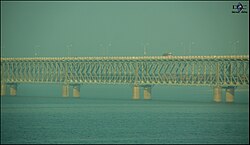Rajamandry
|
Rajamahendravaram Rajamahendravaram |
|
|---|---|
| City | |
| Rajamahendravaram | |

A train moving inside Rail cum Road Bridge
|
|
| Nickname(s): Cultural Capital of Andhra Pradesh | |
| Location of Rajahmundry in Andhra Pradesh | |
| Coordinates: 16°59′N 81°47′E / 16.98°N 81.78°ECoordinates: 16°59′N 81°47′E / 16.98°N 81.78°E | |
| Country | India |
| State | Andhra Pradesh |
| Region | Coastal Andhra |
| District | East Godavari |
| Founded by | Rajaraja Narendra |
| Government | |
| • Body | Rajamahendravaram Municipal Corporation |
| Area | |
| • City | 162.83 km2 (62.87 sq mi) |
| • Metro | 162.83 km2 (62.87 sq mi) |
| Area rank | 3 |
| Elevation | 14 m (46 ft) |
| Population (2011) | |
| • City | 341,831 |
| • Rank |
108th (India) 6th (Andhra Pradesh) |
| • Metro | 476,873 |
| Languages | |
| • Official | Telugu |
| Time zone | IST (UTC+5:30) |
| PIN | 533 1xx |
| Telephone code | +91-883 |
| Vehicle registration | AP 06 |
| Website | rajahmundry |
Rajamahendravaram, whose earlier name was Rajahmundry, is a city in the Indian state of Andhra Pradesh located on the banks of the holy Godavari River in East Godavari district. It is a municipal corporation and also the headquarters of both Rajahmundry Rural and Rajahmundry Urban mandals, administered under Rajahmundry revenue division. As of 2011[update]census, it is the seventh most populous city in the state, with a population of 341,831.
The city is known for its historic traditional, cultural, agricultural and economic backgrounds and hence, it is known as the Cultural Capital of Andhra Pradesh. One of the longest road cum rail bridges across Godavari River, connects the city with the town of Kovvur. The Kotilingeswar Ghat temple on the banks of Godavari river is one of fifty five Shakti Peethas.
In its earlier days, it was called Rajamahendravaram which is a localized version of the Sanskrit name, Rajamahendrapuram (The city of King Mahendra). During the British colonial era it was referred to as Rajahmundry.
On 10 October 2015, the state government officially renamed the city with its original name, Rajamahendravaram.
The city can be traced back to the rule of the Eastern Chalukya king Raja Raja Narendra, who reigned around 1022 AD, after whom it is named – Rajamahendri or Rajamahendravaram. Remains of 11th-century palaces and forts still exist. However, new archaeological evidence suggests that the town may have existed long before the Chalukyas.
...
Wikipedia

